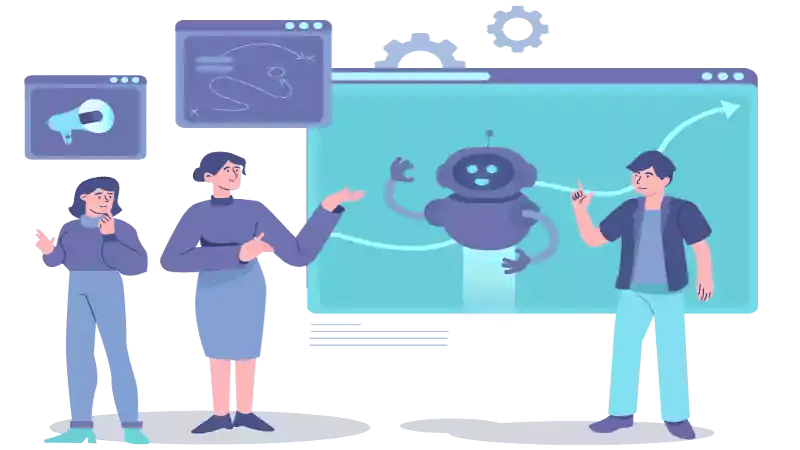Disadvantages of AI in Marketing - How an Agency Can Help
Did you know that 61% of marketers already leverage AI in their campaigns? This shoudn’t come as a surprise – AI has become a game-changer, automating tasks and unlocking valuable customer insights. It's revolutionizing marketing, but it's important to remember AI isn't a magic bullet.
While powerful, it has limitations. To truly thrive in today's data-driven landscape, we need to understand both the strengths and weaknesses of AI, ensuring it complements – not replaces – human expertise.

1. AI Can't Replace Human Understanding
Artificial Intelligence (AI) excels at analyzing data, churning out insights, and identifying patterns. But here's the catch: AI lacks the human touch – the intuitive understanding that breathes life into marketing campaigns.
Take your brand story and values, for example. AI can analyze customer demographics, but it can't grasp the emotional resonance of your brand's narrative. It can't understand how your brand mission connects with customer aspirations. This human understanding is crucial for crafting messaging that resonates and builds brand loyalty.
Similarly, AI can analyze competitor websites and social media, but it struggles with the nuanced understanding of the competitive landscape. It can't perceive the subtle shifts in market trends or anticipate customer reactions to competitor strategies. This human foresight is essential for developing a competitive edge and staying ahead of the curve.
Perhaps the most significant limitation is AI's inability to grasp customer sentiment and emotional triggers. AI can analyze sentiment scores but can't understand the subtle emotional undercurrents in customer reviews or social media conversations. Human intuition, however, can pick up on these nuances, allowing marketers to tailor messaging that evokes the right emotions and drives action.
Consider a crisis communication scenario. AI can't navigate the emotional minefield of a brand crisis. It can't craft an empathetic response that resonates with customers and rebuilds trust. This requires human empathy and emotional intelligence – qualities AI simply doesn't possess.
The same applies to brand positioning. AI can analyze market data but can't tap into the creative spark needed to develop a unique brand voice and positioning strategy. Ultimately, successful marketing decisions often hinge on human intuition, creativity, and emotional intelligence – areas where AI currently falls short.
2. AI Needs a Strategic Roadmap
While AI shines in executing tasks with laser focus, it stumbles when crafting the overall marketing strategy. Here's where the human element becomes crucial. Imagine an AI trying to navigate a maze – it can process the layout, analyze potential paths, and identify dead ends. But without a map or understanding of the end goal, it's likely to wander aimlessly. Similarly, AI struggles with:
-
Setting Marketing Goals Aligned with Business Objectives: AI can analyze data and identify marketing opportunities but lacks the big-picture view. It can't translate business goals like increased sales or brand awareness into specific, measurable marketing objectives. This requires human expertise to bridge the gap between data and desired outcomes.
-
Developing a Comprehensive Marketing Plan: AI can suggest tactics like targeted ads or social media campaigns. However, it can't orchestrate a cohesive marketing plan that integrates various channels and leverages customer insights. A human marketer understands how different tactics work together, creating a seamless customer experience.
-
Adapting to Unforeseen Market Shifts: The marketing landscape is dynamic, with new trends and competitor strategies constantly emerging. Reliant on historical data, AI struggles to adapt to these unforeseen shifts. Human expertise allows marketers to be agile and adjust strategies based on real-time market changes, ensuring campaigns remain relevant and effective.
Think of a successful marketing campaign as a well-planned road trip. AI can be your GPS, expertly navigating specific routes and traffic patterns. But you, the human driver, are essential. You set the destination, choose the scenic route, and adapt to unexpected detours. Likewise, AI thrives within a framework created by human strategy, ensuring your marketing efforts reach the desired outcome.
3. AI Output Needs Human Oversight
AI's ability to churn out content at scale is undeniably impressive. However, it's crucial to remember that AI-generated content isn't flawless. Here's why human oversight remains vital:
-
Factual Inaccuracy Due to Data Bias: AI algorithms learn from the data they're fed. If that data contains biases, the generated content can be factually inaccurate or perpetuate stereotypes. Human editors can identify these biases and ensure truthful content aligns with brand messaging.
-
Lack of Creative Inspiration and Brand Voice: While AI can mimic writing styles, it struggles with genuine creativity and brand voice. AI-generated content can often be bland and generic, failing to resonate with the target audience. On the other hand, human writers can inject creativity, humor, and brand personality into content, making it engaging and memorable.
-
Inappropriate Targeting and Tone: AI can analyze demographics but can't fully grasp the nuances of different audiences. This can lead to content that misses the mark, uses the wrong tone, or fails to address specific audience needs. Human editors with cultural awareness can ensure content resonates with the target audience and avoid unintentional offense.
Imagine a chef relying solely on pre-programmed recipes. The dishes might be technically sound, but they would likely lack the subtle flavors and personal touch that make a meal truly exceptional. Similarly, AI-generated content needs the human touch – the editorial eye that ensures accuracy, injects creativity, and tailors content to resonate with the target audience.
Bridge the Gap Between AI and Human Expertise with a Marketing Agency
The marketing landscape is undergoing a seismic shift with the rise of AI. While AI offers powerful tools for automation, personalization, and data analysis, it lacks the crucial human element that breathes life into successful campaigns. Here's where marketing agencies step in, bridging AI's technical prowess and human creativity and strategic thinking.
A skilled marketing agency can help businesses leverage AI effectively in several key ways:
Develop a Data-Driven Marketing Strategy with Clear Goals
AI excels at analyzing data but can't translate business objectives into actionable marketing strategies. Agencies possess the expertise to delve into your company's data, identify marketing opportunities, and establish clear, measurable goals aligned with your business objectives. This ensures your AI-powered campaigns are laser-focused on driving the desired outcomes.
Utilize AI Tools for Targeted Content Creation and Audience Segmentation
AI content creation tools can be incredibly efficient but often lack the brand voice and creativity needed to engage audiences effectively. Agencies understand the power of storytelling and brand identity. They can leverage AI tools for tasks like content generation and audience segmentation, while human writers inject the brand voice, emotional intelligence, and creative flair that resonates with your target market.
Inject Human Creativity and Brand Understanding into AI Outputs
AI can analyze customer data and identify patterns. However, it can't capture the essence of your brand story and values. With their deep understanding of your brand, marketing agencies can use AI-generated insights to inform creative decisions. They can ensure AI-powered content aligns with your brand voice, resonates with your target audience, and reflects the core values that set you apart.
Monitor and Optimize AI-powered Campaigns for Maximum Impact
AI campaigns require ongoing monitoring and optimization to ensure maximum impact. Agencies have the expertise to track campaign performance, analyze data insights from AI tools, and make real-time adjustments. This ensures your AI-powered efforts constantly evolve and deliver the best possible results.
In addition to these areas of expertise, a marketing agency can empower your business with:
-
Staying Updated on the Latest AI Marketing Trends: AI technology constantly advances. Agencies are dedicated to staying ahead of the latest AI marketing trends and tools, like AI chatbots. This ensures you benefit from cutting-edge solutions tailored to your specific marketing needs.
-
Access to a Wider Range of AI Marketing Tools and Platforms: Keeping up with the ever-expanding array of AI marketing tools can be overwhelming. Agencies can access a wider range of these tools than most in-house marketing teams. They can select the most appropriate tools for your unique needs and marketing goals, maximizing your return on investment in AI technologies.
-
Continuous Improvement and Refinement of Marketing Strategies: With ongoing data analysis and campaign monitoring, agencies can continuously refine your marketing strategy. Data-driven marketing with AI provides valuable data insights, while human expertise identifies areas for improvement and strategizes adjustments to optimize your marketing efforts for long-term success.
Learn How Artificial Intelligence Can Jumpstart Business Development
Ultimately, while AI offers powerful tools for marketing automation and data analysis, it can't replace the critical human element in developing and executing successful campaigns. A marketing agency bridges this gap, leveraging AI's capabilities while injecting the human creativity, brand understanding, and strategic thinking that drives truly impactful marketing.
Don't be left behind in the AI marketing revolution! Partner with Aspiration Marketing today and explore how our team of experts can help you develop a data-driven marketing strategy leveraging AI and human ingenuity to achieve remarkable results.
This content is also available in:
- German: Nachteile von KI im Marketing - wie eine Agentur helfen kann
- Spanish: Desventajas de la IA en el marketing: cómo puede ayudar una agencia
- French: Inconvénients de l'IA et le marketing - Comment une agence peut aider
- Italian: Svantaggi dell'IA nel marketing - Come può aiutare un'agenzia
- Romanian: Dezavantajele AI în marketing - Cum poate ajuta o agenție
- Chinese: 人工智能在营销中的弊端--机构如何提供帮助

Joachim is a certified HubSpot trainer with over 13 years of experience in content marketing, strategy, website development, and SEO. He has implemented numerous large-scale, international growth marketing programs, including one with UiPath, which grew from a startup to a successful IPO on the NYSE. Joachim has special expertise in multilingual marketing and sales enablement projects, and he uses the latest AI technologies to help our clients.







Leave a Comment